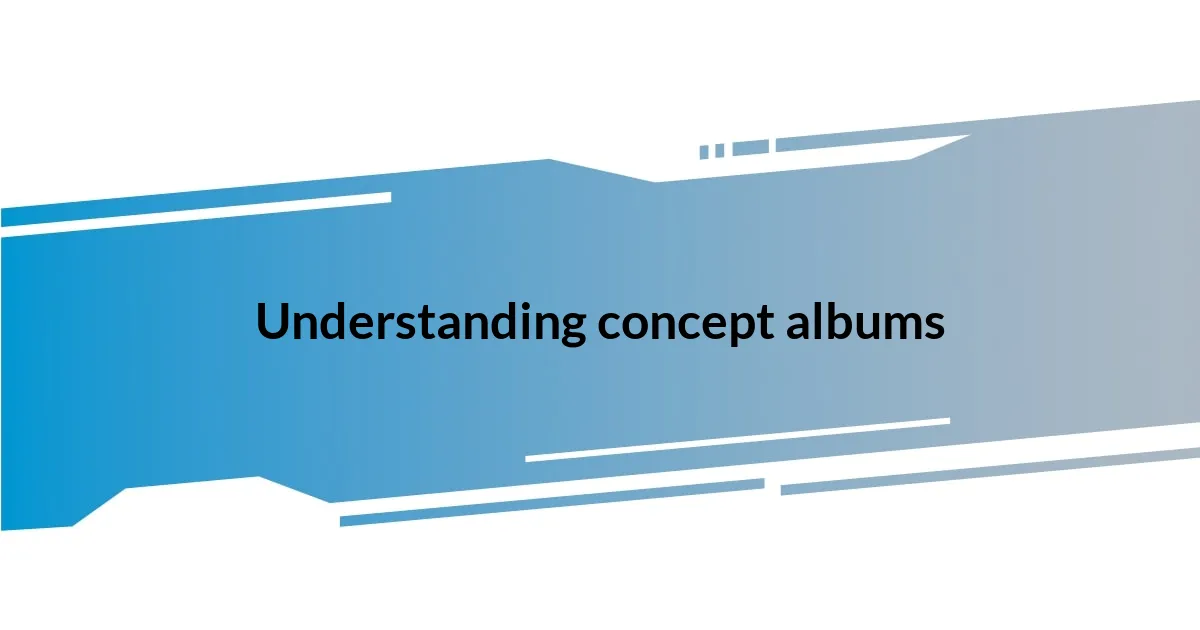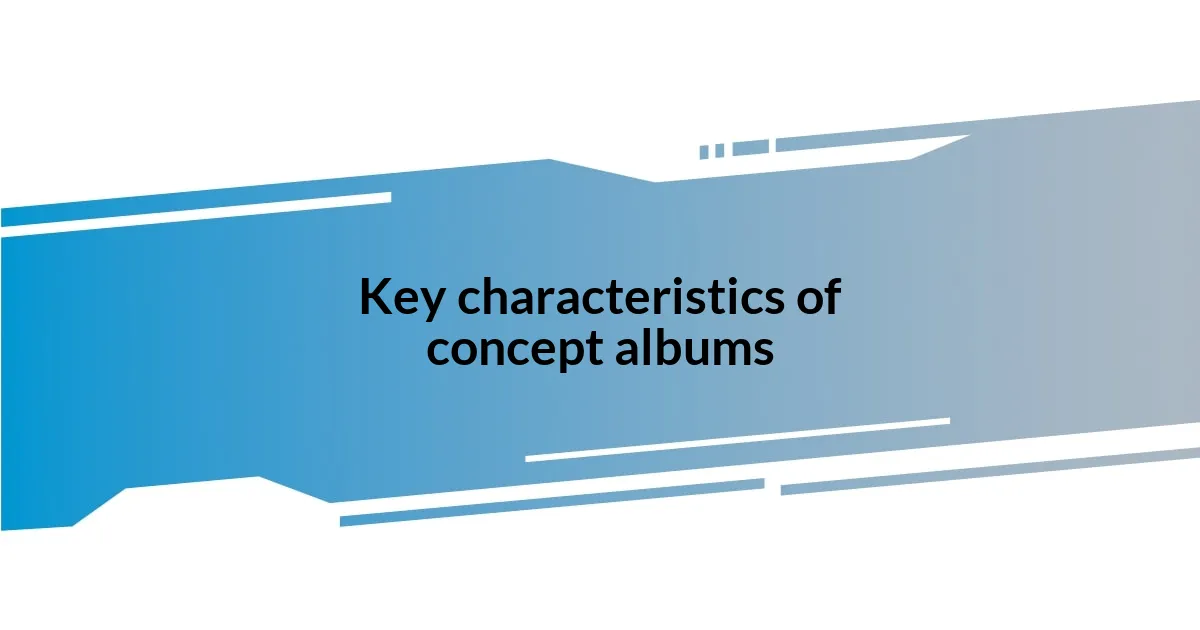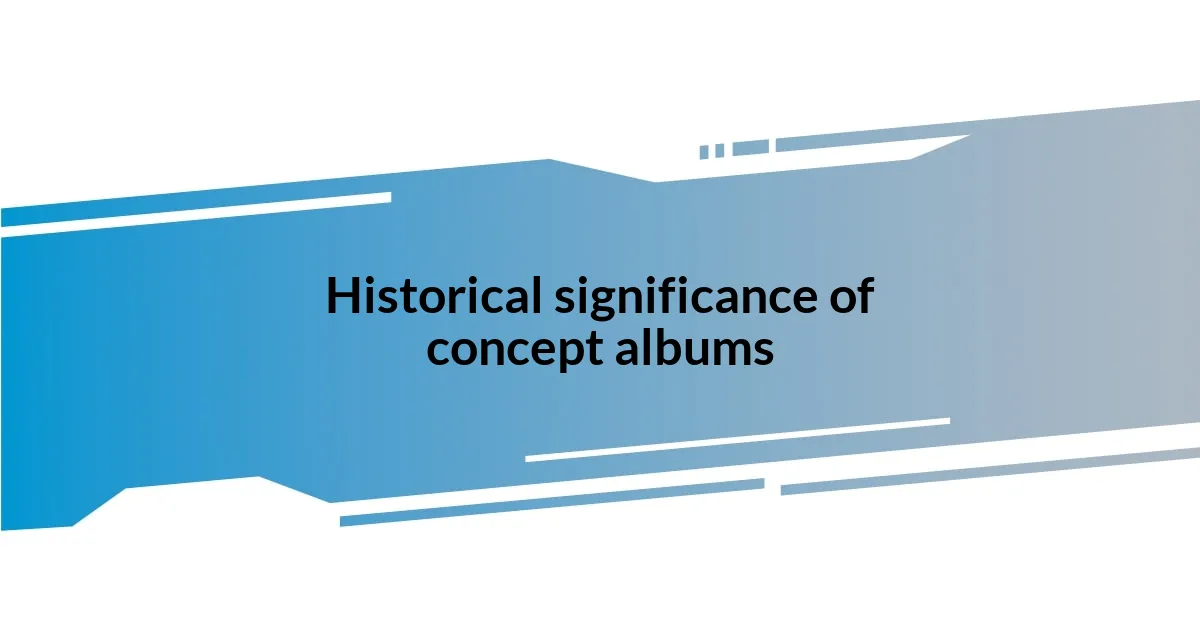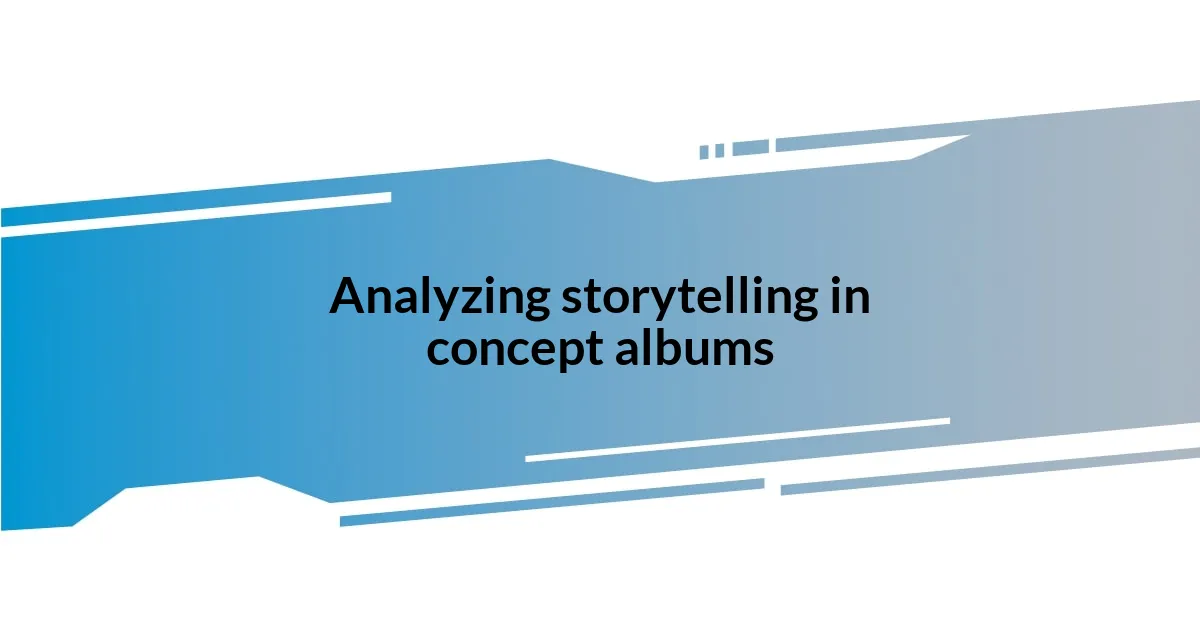Key takeaways:
- Concept albums are unified musical works that tell a cohesive narrative, engaging listeners emotionally and personally.
- Key characteristics include a unified theme, character development, interconnected tracks, atmospheric consistency, and complementary visual elements.
- Historically, concept albums emerged in the 1960s, significantly influencing music as platforms for social commentary and artistic expression.
- Notable examples like Pink Floyd’s “The Wall” and Green Day’s “American Idiot” highlight how storytelling in music creates powerful, relatable experiences for listeners.

Understanding concept albums
Concept albums are musical works that explore a unified theme or narrative throughout the entire record, rather than just presenting a collection of individual songs. I remember the first time I listened to Pink Floyd’s “The Wall”—it felt like a journey rather than just a set of songs. It made me think: how is it that one album can tell such a profound story?
Often, these albums invite listeners to engage on multiple levels, as they weave together lyrics, instrumentation, and even artwork to create an immersive experience. For instance, when I listened to Janelle Monáe’s “The ArchAndroid,” I was drawn into her imaginative world, feeling as if I were part of a larger narrative exploring identity and freedom. Can you think of a time when music transported you into an entirely different realm?
The beauty of concept albums lies in their ability to foster emotional connections—each track builds upon the last, deepening the listener’s understanding of the theme. I’ve often found myself reflecting on the stories being told, noting how each sound and lyric resonates with my own experiences, making the concept feel personal and relatable. Isn’t it fascinating how music can create such a profound bond through storytelling?

Key characteristics of concept albums
When diving into concept albums, several key characteristics stand out. They typically embody a cohesive narrative or central theme that threads through each song. I remember reveling in the intricacies of David Bowie’s “The Rise and Fall of Ziggy Stardust and the Spiders from Mars.” Each track felt like a chapter in a compelling story, portraying Ziggy’s journey and struggles, which made me truly empathize with the character’s plight. It’s this type of storytelling that sets concept albums apart from traditional collections.
Here are some of the defining traits of concept albums:
- Unified Theme: Every song contributes to the overall narrative or idea, making the album feel like a singular work.
- Character Development: Many concept albums feature characters that evolve throughout the tracks, enriching the listening experience.
- Interconnected Tracks: Songs often flow seamlessly into one another, creating a musical journey that enhances the storytelling aspect.
- Atmospheric Consistency: The instrumentation and production choices often maintain a consistent sound, supporting the album’s theme.
- Visual Elements: Artwork and visual presentations often complement the narrative, offering another layer to the overall experience.
These elements can transform an album into a deep, immersive experience. Like when I listened to The Who’s “Tommy,” I found myself not just hearing the music, but visualizing the story, connecting with Tommy’s emotions as he navigates through his challenges. Music can truly transcend mere melodies, inviting us to connect with deeply human experiences.

Historical significance of concept albums
The historical significance of concept albums cannot be overstated. They emerged in the 1960s as artists sought to push the boundaries of traditional music formats. I remember listening to The Beatles’ “Sgt. Pepper’s Lonely Hearts Club Band” and feeling like it was a whole world of creativity packed into one album. This wasn’t just music; it was an experience—a showcase of artistic expression that significantly influenced how albums were crafted thereafter.
Throughout music history, concept albums have served as a platform for social commentary and storytelling. For instance, when I first encountered Green Day’s “American Idiot,” it struck me as a reflection of societal angst and political disillusionment. It felt revolutionary, delivering powerful messages through a tight narrative thread, which encouraged artists to explore deeper themes in their work. Isn’t it inspiring how these albums can offer a lens into the cultural zeitgeist?
The evolution of concept albums has paved the way for diverse genres to experiment with storytelling. My own journey with artists like Kendrick Lamar through “To Pimp a Butterfly” revealed how profound personal narratives can resonate with broader societal issues. Such creative explorations push the boundaries of what music can achieve, proving that concept albums remain a vital part of our musical landscape.
| Album | Significance |
|---|---|
| Sgt. Pepper’s Lonely Hearts Club Band | Defined the concept album as a cohesive and immersive experience. |
| The Wall | Explored themes of isolation and war, showcasing a narrative depth in rock music. |
| American Idiot | Reflected political and social turmoil, marking a shift towards concept-driven punk rock. |
| To Pimp a Butterfly | Delved into personal and societal issues, redefining hip-hop storytelling. |

Notable examples of concept albums
One standout example that I often think about is Pink Floyd’s “The Wall.” This concept album dives deep into themes of isolation and mental anguish. I vividly recall the first time I listened to it in its entirety—I was struck by how the music mirrored the protagonist’s journey through suffering and alienation. It made me ponder how many of us build walls to shield our vulnerabilities.
Similarly, I can’t overlook Genesis’ “The Lamb Lies Down on Broadway.” The sheer audacity of its narrative and characters amazed me. It’s a psychedelic journey that invites listeners into a surreal world, featuring Rael and his adventures in New York City. I found myself wrapped up in Rael’s quest, questioning my own reality, which adds a level of personal engagement that few albums manage to achieve.
Then there’s “American Idiot” by Green Day, which hit me in a different way altogether. It felt like a direct response to the political climate of the 2000s. Upon my initial listen, I could practically feel the frustration radiating from each track. This album wasn’t just music; it was a rallying cry, a powerful commentary that resonated with my own feelings of discontent during that time. How incredible is it that music can articulate the collective voice of a generation?

Analyzing storytelling in concept albums
Storytelling in concept albums is fascinating because it transforms music into a narrative journey. Take “The Wall,” for instance; it’s not just a collection of songs, but a story that unfolds. I remember listening to it while driving late at night, utterly absorbed in the protagonist’s descent into despair. The way the tracks interweave creates a seamless experience, where each song builds upon the last, inviting reflection as you navigate through the character’s struggles.
Additionally, the emotional storytelling is what captivates me the most. Albums like “To Pimp a Butterfly” weave personal and societal issues into a rich tapestry of sound. I recall my own reaction when I first heard “Alright” — it felt like a breath of fresh air amidst turmoil. The optimism in the face of adversity resonated deeply. How can a collection of verses and melodies evoke such powerful emotions? It’s a testament to the artists’ ability to channel their experiences into something universally relatable.
Lastly, concept albums often challenge listeners to think critically about the narratives being presented. With each listen, I discover new layers and meanings. Each story carries its own unique essence and, depending on where you are in life, the interpretation can shift dramatically. Have you ever experienced a song one way and then years later, it hits you totally differently? That’s the magic of storytelling within concept albums — it evolves with us, creating a dynamic relationship between the music and the listener.